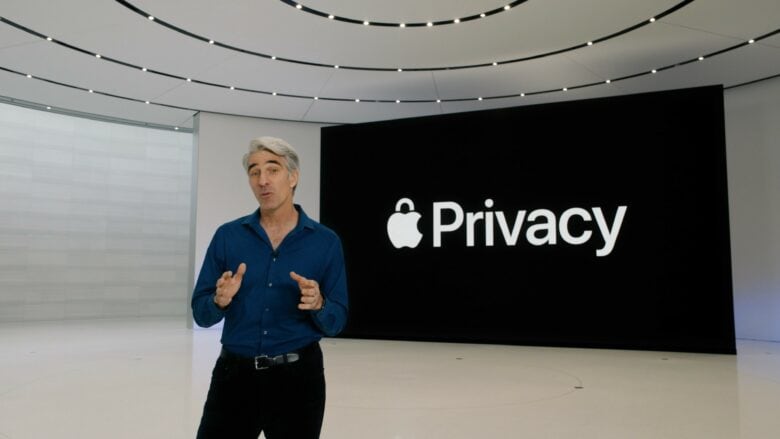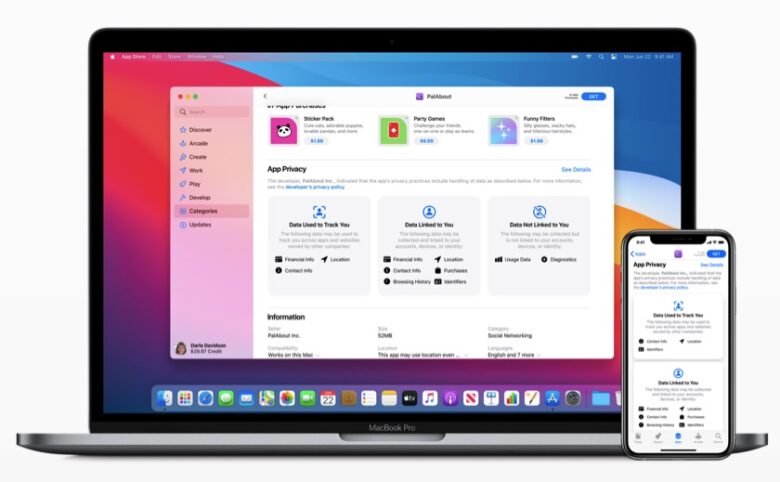What do you do when you pick up some food in the store, and want to quickly check how good or bad it is for you? You glance at the nutrition label, of course.
Throughout the last century, mandated labels on food forced manufacturers to reveal more and more information about the contents of their products — and their effects on people who consume them. Now Apple is bringing that same level of insight to apps in the App Store.
It’s about time!
As apps become ever more central to our lives — with increasing access to our most sensitive personal data — transparency about exactly how developers use that information is becoming more necessary than ever.
App ‘nutrition labels’ are part of Apple’s privacy drive
On Thursday, Apple told developers they must provide publicly viewable data about their apps’ privacy and data policies. This will become mandatory for any app that wants to be housed in the App Store, starting December 8.
Developers must disclose what happens to user data, whether that data gets linked to individual users, whether the information is tracked across multiple apps, etc. The disclosures also will fill you in on whether the data is used for advertising, analytics or personalizing the apps you use. These details will be displayed on the app’s page in the App Store, making it easier for users to make informed choices about the tools they use.
The new rule shouldn’t come as a surprise to developers. Apple introduced the feature at June’s virtual Worldwide Developers Conference. It’s the latest step in Apple’s pro-privacy mission, which previously saw the company take on everyone from the FBI to the data-grubbing business models of tech giants like Google and Facebook.
Apple’s defense of user privacy dates back to the Steve Jobs era. However, the push for privacy has become supercharged under the leadership of Apple CEO Tim Cook. (And, with the level of surveillance tech used today, it’s really no surprise!) This latest feature may be one of the strongest statements Apple has made yet.
Privacy and the Apple user experience

Photo: Apple
One of the interesting things about the pro-privacy features in iOS 14 is that, in some ways, they go against Apple’s “it just works” mantra. Apple software typically takes the complexity out of using technology. The company doesn’t spam users with notifications or otherwise disrupt their experience. There’s plenty of complexity under the surface, but Apple is judicious about the information it displays.
Apple considers user privacy — and which apps are spying on you — to be worth interrupting the user experience. These “nutrition labels” are just one of several privacy features rolling out as part of the iOS 14 refresh. Others include prompts about when apps are tracking you, letting users actively opt out. Companies like Facebook, which rely on advertising for their business models, have already spoken out against the new privacy measures — even arguing that they are anticompetitive.

Photo: Apple
Apple interface designers take very seriously the question of when to show users information that could seem to complicate the experience of using its products. (Cupertino also has been caught up in privacy controversies in the past. For instance, the company did not sufficiently state that some Siri requests were being listened to by contractors. Apple wound up offering users a way to opt out of this eavesdropping.) But the company clearly considers this important enough to warrant the disruption. It’s hard to disagree with Apple.
How healthy are our apps?
In the book Setting Nutritional Standards: Theory, Policies, Practices, Food and Drug Administration historian Suzanne Junod writes:
“The modern U.S. food-package label has evolved steadily throughout the 20th century, and its content and format are regularly revised to reflect and apply new knowledge in the fields of medical, nutritional and regulatory science.”
Hopefully, Apple’s new “nutrition label” for apps will be just the start of a move toward increased transparency. Apple could let users know whether, for instance, the use of certain apps affects our sleep cycles, the amount of exercise we get or our productivity levels. Features like Screen Time show that Apple cares about how long we’re looking at our devices, and wants to foster positive experiences. Its business model — compared to the advertising-centric models of other tech giants — gives it the luxury to do that.
Documentaries like Netflix’s The Social Dilemma and Jean Twenge’s book iGen show how today’s technology shapes behavior in a way that many people don’t completely understand. Privacy is just one part of that.
Let’s hope Apple takes this initiative all the way. It’s a great move on the company’s part.


